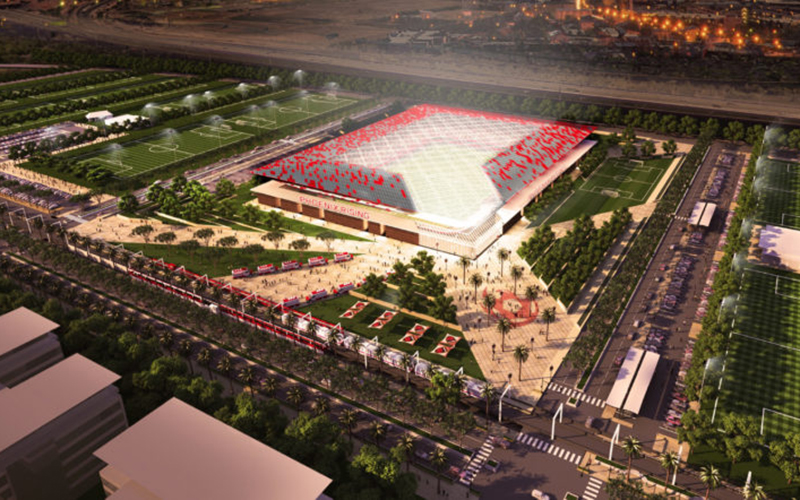
A rendering of the potential permanent MLS stadium for Phoenix Rising FC. (Image courtesy of Phoenix Rising FC)
TEMPE — In a dirt lot, trucks whir and beep, their sounds filling gaps in the sound of passing traffic. Construction is underway on a temporary soccer stadium for Phoenix Rising FC.
The owners of the team hope that someday the sound is replaced with the roar of thousands of fans supporting a Major League Soccer franchise. They believe they have laid the groundwork — literally and figuratively — to achieve that goal.
Phoenix Rising, a Division II team in the United Soccer League, submitted its bid at the end of January to join MLS as an expansion franchise in the 2020 season. The ownership team recently was invited to New York and presented its case to the league, which granted the organization an application.
Two of the four cities that will be awarded expansion teams are expected to be announced by the fall. The cities in competition with Phoenix include Sacramento, San Diego, San Antonio, St. Louis, Nashville, Indianapolis, Cincinnati, Detroit, Tampa Bay, Charlotte and Raleigh.
Co-owner and board member Tim Riester, a 50-year-old advertising executive, said he and his team had a short window to complete their application because they were a last-minute addition to the list of applicants, which includes 11 other cities.
“Most of the other cities had many, many months to work on that application, and we had 10 days,” Riester said.
Riester and his team submitted the application before the Jan. 31 deadline, including the full overview of their pitch. The three most important factors for selection, according to Riester, are financial security, a stadium plan and strong fan support.
“MLS has very specific requirements, and we’ve checked all those boxes for them,” Riester said. “We have the net worth and ownership group, we have the stadium solution. The only piece that’s left to prove to MLS is that we can fill a stadium with extremely supportive soccer fans game after game.”
Phoenix Rising’s temporary stadium is under construction in a noisy dirt lot off McClintock Drive and the Loop 101 in Tempe. The club secured 45 acres of land with the help of the Salt River Pima-Maricopa Indian Community, and is using 16 of those acres for the temporary “pop-up” stadium.
Riester said the same people in charge of setting up the stands for the Waste Management Phoenix Open are putting the stadium together.
“Imagine that beautiful Par-3 with a FIFA qualified soccer pitch in the middle instead,” Riester said. “That’s what fans are going to see on March 25 and for the next few years.”
The club’s goal is to replace the temporary stadium with a permanent home on the same property by 2020, fit with a climate-controlled stadium, surrounding fields and light rail access. Phoenix Rising has yet to disclose the cost of the potential stadium but has stated that public funds won’t be necessary.
Riester beams when discussing a potential MLS home. He sees it as the next stage in the gradual development of professional sports in the valley.
“As soon as MLS gives us the green light for an expansion franchise, we’ll break ground on a much larger stadium to meet their requirements,” Riester said. “We’re ready to go.”
Major sporting events like the Super Bowl, Final Four and College Football Playoff National Championship have descended on Arizona in recent years. These events, along with mainstays like the Fiesta Bowl and Phoenix Open, show that a defined sports culture exists in the Valley.
But the question remains if a soccer culture does. Phoenix has the largest population among the 12 applicants, including the largest Latino population, but the level of fan support for Phoenix Rising might be what keeps the team from a bid.
The frontrunners for MLS expansion include Sacramento and St. Louis, with San Diego and Cincinnati likely rounding out the four slots. Average attendance last season for Phoenix Rising FC hovered around 1,500, while FC Cincinnati set an attendance record with nearly 25,000 at one of its home games in September.
Phoenix Rising officials are still searching for ways to narrow the gap but have made finding a solution a priority. Riester pointed to the 60,000 that attended the Copa America Mexico-Uruguay match at University of Phoenix Stadium in June as a sign that there is an audience to tap.
The league is watching.
“We’re going to be pretty rigorous in trying to analyze each market and whether we think the fundamentals are there for success,” MLS President and Deputy Commissioner Mark Abbott said in a media teleconference, “including whether we think the fan support will be there.”
For a long-term shot at joining MLS, Phoenix Rising needs to display the kind of fan support that would make the club an attractive expansion destination. The money is there and the stadium is planned.
All that remains is putting bodies in the seats.